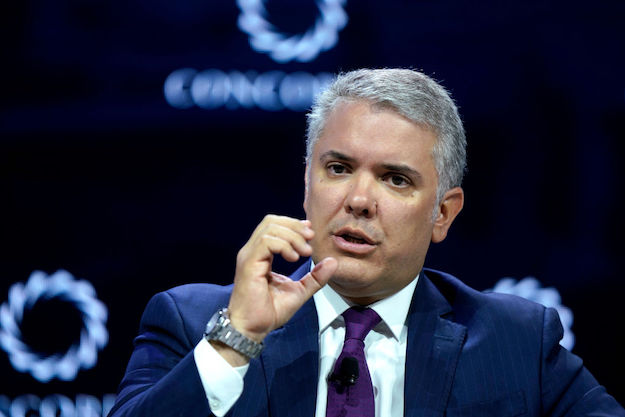Even before he starts his presidential term in August, Colombia’s president-elect, Juan Manuel Santos, has already broken records.
A scion of Colombia’s establishment, Santos pulled in just over 9 million votes, winning 69 percent of the vote against the 27 percent secured by his rival, Antanus Mockus. Santos’ victory is the highest percentage of votes secured by a presidential candidate in Colombia’s history.
The political alliances Santos has already made with the main right-wing Partido Conservador Colombiano and Cambio Radical parties and leading Partido Liberal Colombiano members, will give him a resounding majority, around 80 percent, in Colombia’s Congress and Senate. That is a stronger mandate than the popular and outgoing President Álvaro Uribe had.
The architect of crushing blows against the Fuerzas Armadas Revolucionarias de Colombia (FARC) rebels and audacious hostage rescues during the Uribe government, Santos is also considered by many to have been the country’s most prolific defense minister.
For those close to Santos, these achievements come as little surprise for a man who has been grooming himself for the top job since his youth. His love of politics was fuelled during his time as a graduate student in London, where he would visit the British parliament and listen for hours to the live debates.
By electing Santos, Colombians voted resoundingly for continuity. Santos has vowed to continue the Uribe government’s hallmark Democratic Security policy, which has weakened the FARC insurgency, improved security and led to a five-fold increase in foreign investment.
This was the least violent elections in four decades. But still nine policemen and soldiers were killed in clashes with leftwing rebels, a reminder that the waning insurgency is still a security threat and a government priority.
“We can’t lower our guard (against the FARC),” Santos told reporters shortly after his victory, displaying his characteristic zeal in defeating the rebels.
Just a day after his election victory, the first ministerial appointment Santos made was naming Juan Carlos Echeverry for the job of finance minister, reflecting the urgent economic challenges Colombia faces.
The nation’s economy is expected to grow at 3 percent this year, lower than most leading economies in Latin America. Bringing down Colombia’s high deficit, 4.2 percent of GDP, and high unemployment rate, which at 12 percent is one of the region’s highest, will be top priorities.
Over his four-year tenure, Santos promises to create 2.5 million new jobs, have at least one person in every family working in a formal job and build 1 million new homes for low-income families. That would mean nearly 700 new homes built per day. He has also pledged to lift 7 million Colombians out of poverty and 4 million people out of extreme poverty.
And all this without raising taxes, according to Santos. Such ambitious goals, say critics, will be hard to reach in a fragile economic climate.
A former foreign trade and finance minister, Santos remains undeterred. Along with improving tax collection and government efficiency, Santos has identified five key drivers of economic growth that his administration will focus on: mining, agriculture, infrastructure, social housing, and science and technology.
He is also banking on commodity revenues to fund government spending. Royalties from Colombia’s booming oil and mining sectors are expected to reach nearly 2 percent of GDP.
Santos intends to “advance from democratic security towards democratic prosperity,” reflecting the greater emphasis his government aims to place on tackling Colombia’s entrenched social problems.
But ensuring prosperity will be a major challenge. Just under half of Colombia’s population of 45 million live in poverty. Bearing the brunt of social inequality are Colombia’s 4 million or so displaced people who have been driven from their homes as part of the armed conflict. It is a humanitarian crisis that shows little signs of abating.
Other challenges include reintegrating some 35,000 right-wing paramilitary fighters who laid down their arms during the Uribe government, a pressing issue that rights groups say must receive more investment and commitment from the government. Few demobilized fighters have secured jobs or places in government training programs, prompting some to join criminal gangs and regroup, which is fueling urban crime.
While there is little difference between the core policies of Santos and Uribe, there will be a marked difference in their style of leadership.
In contrast to Uribe, who is known for being a domineering micromanager, Santos is a seasoned technocrat and is likely to delegate more and give ministers greater political clout and autonomy.
This change in governing style could help improve strained relations with the executive and Supreme Court, say local analysts. Santos has already met with Colombia’s two top judges to smooth relations.
Santos also faces significant hurdles in improving Colombia’s relations with its neighbors.
Foreign policy, says Santos, will be based on “diplomacy and respect,” and he wants to mend fraught relations with Venezuela and Ecuador.
Venezuela, which broke off diplomatic relations with Colombia in 2008 following a border incident, sent a lukewarm congratulatory message to the president-elect, saying it will be “paying attention” to the statements of the new government.
In what could be seen as a slight shift away from the country’s U.S.-centric foreign policy, Santos wants Colombia to have a greater leadership role in Latin America, particularly on combating poverty and drug policy, and play a more active role in regional affairs through bilateral institutions like the Union of South American Nations (UNSAUR).
“Colombia has a lot to offer the world,” said Santos during his victory speech. “After 40 years of being on the defensive, we hope to assume the leadership that is incumbent upon us.”
But hose likely to remain outside of Santos’ so-called “government of national unity” are the opposition parties, including the leftist Polo Democrático Alternativo, and to a lesser extent the Partido Verde Colombiano led by Mockus. Still, both parties are set to play an important role as corruption watchdogs, another pressing issue that the Santos government will need to address.








